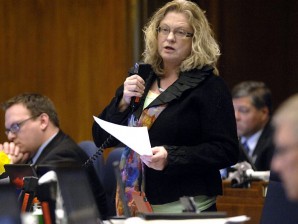
Rep. Gail Mooney, D-Cummings, speaks against division A of SB2303 during floor debate, Friday, March 22, 2013 at the state Capitol in Bismarck, N.D. Long dismissed as cold and inconsequential, North Dakota is now trying to enact the toughest abortion restrictions in the nation. The newly oil-rich red state may soon find itself in a costly battle over legislation foes describe as blatantly unconstitutional. AP Photo/The Bismarck Tribune, Mike McCleary
BISMARCK, North Dakota—The cold, thinly populated state of North Dakota is trying to enact the toughest abortion restrictions in the US. It may soon find itself in a costly battle over legislation that opponents describe as blatantly unconstitutional.
Lawmakers on Friday took a step toward outlawing abortion altogether in the state by passing a resolution that says a fertilized egg has the same right to life as a person. The approval sends the matter to voters, who will decide whether to add the wording to the state’s constitution in November 2014.
It’s one of several anti-abortion measures to pass the Legislature. Most are awaiting the signature of Republican Governor Jack Dalrymple, who hasn’t yet indicated whether he supports them. Even if he vetoes them, some could have enough support for the Legislature to override him.
Supporters of the measures hope to challenge the US Supreme Court’s landmark Roe v. Wade ruling in 1973 that legalized abortion up until a fetus is considered viable, usually around 22 to 24 weeks into a pregnancy. They also acknowledge they want to shut down the state’s only abortion clinic for its 700,000 residents.
“I’m from the group who hates voting on abortion issues and who don’t like to play God,” said state Sen. John Andrist, a Republican who describes himself as “moderately pro-life” and has voted for some but not all of the restrictions North Dakota has taken up this year. “But we have some strong-willed people in this state who do.”
One bill would prohibit abortion if a fetal heartbeat can be detected, which can happen as early as six weeks into a pregnancy. Another would make North Dakota the only state to prohibit women from having the procedure because a fetus has a genetic defect, such as Down syndrome.
Though similar proposals in other states have faced fierce opposition, almost all of the anti-abortion measures in North Dakota this year have passed with little debate and with overwhelming support.
Why is this happening in North Dakota, and why now?
The answer lies in part with the disintegration of an anti-abortion group of lawmakers that used to take the lead on introducing bills aimed at the procedure. Longtime Sen. Tim Mathern, a Democrat who once led the group, said it favored a more gradual approach to ending abortion in the state, focusing on measures it thought would withstand legal challenges.
Without the group, some of the Legislature’s most ardent abortion opponents are taking up the cause, introducing bills crafted by out-of-state organizations or from examples found on the Internet.
Republican Sen. Margaret Sitte introduced some of this year’s anti-abortion measures. She said the idea came from her heart — with inspiration from former President Ronald Reagan and legal language lifted from an online encyclopedia.
“There was no grandiose plan,” Sitte said, adding that the template for the personhood resolution came from a quick web search. “It came from Wikipedia.”
Jordan Goldberg, state advocacy counsel for the New York-based Center for Reproductive Rights, said the measures are backed by large anti-abortion organizations or smaller “fringe” groups.
“None of the bills originated in North Dakota. All the bills came from out of state, every single one of them,” Goldberg said.
North Dakota is uniquely positioned to undertake an expensive legal fight. Fueled by a unprecedented oil bonanza, the state boasts a nearly $2 billion budget surplus and has the lowest unemployment rate in the nation.
Still, the record production that has thrust the state to the nation’s No. 2 oil producer behind Texas also has brought challenges, including more crime brought on by an exploding population.
Rep. Kathy Hawken, a Republican who supports legal abortion, said she believes most residents would prefer to see lawmakers focus on other issues, such as taxes and education.
“This is not coming from here, from the people of our state. It’s coming from out of state,” she said of the anti-abortion legislation.
Hawken is among a bipartisan group of about 10 lawmakers who have urged the governor to veto anti-abortion measures.
“We’re clearly not the brightest bulbs in the bunch if we take a legal medical procedure and try and make it illegal,” she said.